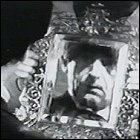 The Doctor recovers from his first regeneration quickly, only to find himself trying to reassure Ben and Polly that the diminutive person who now shares the TARDIS with them is, in fact, their time-traveling companion. The TARDIS takes them from the South Pole to the planet Vulcan in the distant future, where an Earth expedition has made a disturbing discovery in the planet’s mercury pools – deactivated, but perfectly preserved, Daleks. The chief scientist of the human colony on Vulcan reactivates the Daleks, who promptly vow obedience and subservience…but even after a traumatic regeneration, the Doctor doesn’t believe this for a second. But someone in the colony may know the Daleks’ true colors – and may be using them to achieve a sinister objective anyway.
The Doctor recovers from his first regeneration quickly, only to find himself trying to reassure Ben and Polly that the diminutive person who now shares the TARDIS with them is, in fact, their time-traveling companion. The TARDIS takes them from the South Pole to the planet Vulcan in the distant future, where an Earth expedition has made a disturbing discovery in the planet’s mercury pools – deactivated, but perfectly preserved, Daleks. The chief scientist of the human colony on Vulcan reactivates the Daleks, who promptly vow obedience and subservience…but even after a traumatic regeneration, the Doctor doesn’t believe this for a second. But someone in the colony may know the Daleks’ true colors – and may be using them to achieve a sinister objective anyway.
written by David Whitaker
directed by Christopher Barry
music by Tristram CaryGuest Cast: Martin King (Examiner), Nicholas Hawtrey (Quinn), Bernard Archard (Bragen), Robert James (Lesterson), Pamela Ann Davy (Janley), Peter Bathurst (Hensell), Edward Kelsey (Resno), Richard Kane (Valmar), Peter Forbes-Robertson (Guard), Steven Scott (Kebble), Robert Russell (Guard), Robert Luckham (Guard), Gerald Taylor (Dalek), Kevin Manser (Dalek), Robert Jewell (Dalek), John Scott Martin (Dalek), Peter Hawkins (Dalek voice)
Note: The master tapes of this episode were destroyed by the BBC in the early 1970’s, and no video copies exist.
Broadcast from November 5 through December 10, 1966
LogBook entry & review by Earl Green
Review: Oh, how I wish more than a few scant clips of this six-parter existed; I had to listen to it in audio form instead. But the most compelling conflict of the entire story is undoubtedly that between the Doctor and his companions, who are a little bit skeptical after his first change of body. And considering that this was the first time the Doctor had changed his appearance in the then-short history of the show, this was played to maximum effect for the shocked audience as well.
 In this era of the show, it was wise – no, almost necessary – to include the Daleks to ensure that the audience wouldn’t desert the show in droves, especially as Dalekmania was still alive and well, even if recent Hartnell era missteps such as The Gunfighters had diminished the luster of the series that spawned them. And what an interesting and atypical appearance for the Daleks! They actually exercise something not unlike cunning and guile in this story, qualities which would gradually be excised from the most popular of the Doctor’s villains in the 1970s and 80s. The reuse of Tristram Cary‘s memorable music from their first appearance in the show was an inspired touch, coming real close to cementing a specific theme for the Daleks.
In this era of the show, it was wise – no, almost necessary – to include the Daleks to ensure that the audience wouldn’t desert the show in droves, especially as Dalekmania was still alive and well, even if recent Hartnell era missteps such as The Gunfighters had diminished the luster of the series that spawned them. And what an interesting and atypical appearance for the Daleks! They actually exercise something not unlike cunning and guile in this story, qualities which would gradually be excised from the most popular of the Doctor’s villains in the 1970s and 80s. The reuse of Tristram Cary‘s memorable music from their first appearance in the show was an inspired touch, coming real close to cementing a specific theme for the Daleks.
It’s an intriguing story overall, one which stands up well as a purely auditory experience…but given its pivotal place in Doctor Who history, I could still harbor a few dreams of the entire video component being found intact somewhere overseas.
